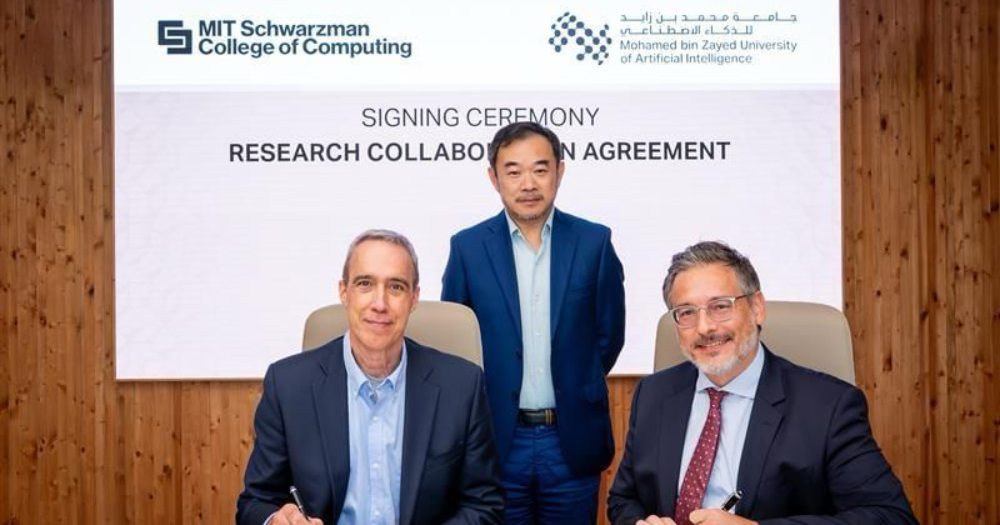MBZUAI, MIT Schwarzman College of Computing partner on AI research

Two giants of artificial intelligence are teaming up. The Mohamed bin Zayed University of Artificial Intelligence (MBZUAI) and MIT's Schwarzman College of Computing have launched a collaborative research program aimed at advancing AI in three key areas: scientific discovery, human well-being, and environmental sustainability. The new initiative, the MIT-MBZUAI Collaborative Research Programme, signals a shared belief that AI is no longer just about algorithms and models — it's about solving humanity's most urgent challenges.
As Professor Eric Xing, President of MBZUAI, put it: "Together, we will not only expand the boundaries of AI science but also ensure that these breakthroughs are pursued responsibly and applied where they matter most — improving human health, enabling intelligent robotics, and driving sustainable AI at scale."
How does it work?
The program brings researchers, faculty, and students from both institutions under one roof — intellectually speaking — to run high-impact projects. Each project will be co-led by a principal investigator from MBZUAI and one from MIT, ensuring true collaboration rather than parallel tracks.
The collaboration will focus on three core areas:
- Scientific discovery - using AI to accelerate research in fields ranging from biology to materials science.
- Human thriving - from healthcare innovation to robotics that improve quality of life.
- Planetary health - deploying AI for sustainability, efficient computing, and climate solutions.
Le Song, Professor of Machine Learning at MBZUAI, and Philip Isola, Career Development Professor at MIT's EECS department, will serve as the academic directors. Their job: keep the research ambitious, relevant, and ethically grounded.
Why does it matter?
This isn't just another academic handshake. It's an alliance with teeth. By pooling expertise, MBZUAI and MIT are betting that AI can make the leap from theory to impact — faster and more responsibly.
- For healthcare, this could mean cutting down costly lab work by building "multi-scale biological foundation models of the human body," as MBZUAI's Professor Sami Haddadin explained. "We can accelerate the discovery process itself and create possibilities for a new era of healthcare innovation while reducing costly lab work and data generation at scale."
- For sustainability, it could mean AI models designed with efficiency in mind, avoiding the runaway carbon footprint of today's largest systems.
- For robotics, it's about enabling machines that assist rather than replace, supporting human needs in smarter, safer ways.
As MIT's inaugural dean of the Schwarzman College of Computing, Daniel Huttenlocher, noted: "Our collaboration with MBZUAI reflects a shared commitment to advancing AI in ways that are responsible, inclusive, and globally impactful."
The context
This agreement didn't come out of thin air. MIT has long positioned its Schwarzman College of Computing as a hub where technical depth meets social responsibility. At the same time, MBZUAI has emerged as a serious contender in global AI research, part of the UAE's broader strategy to become an innovation hub that punches above its weight.
The partnership aligns with the priorities of both institutions: MIT's mission to integrate computing across disciplines and MBZUAI's drive to foster high-impact AI research in the Middle East. For the UAE, it also reinforces national ambitions — becoming a magnet for talent, investment, and cutting-edge AI work.
In short, this is more than a bilateral agreement. It's a signal that AI's next chapter will be written not in isolation, but through collaborations that span continents, cultures, and use cases.
💡Did you know?
You can take your DHArab experience to the next level with our Premium Membership.👉 Click here to learn more
🛠️Featured tool
 Easy-Peasy
Easy-Peasy
An all-in-one AI tool offering the ability to build no-code AI Bots, create articles & social media posts, convert text into natural speech in 40+ languages, create and edit images, generate videos, and more.
👉 Click here to learn more


